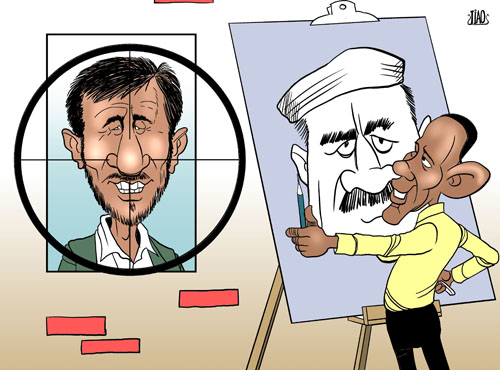Iran nuclear talks: interaction without communication
 |
| In the frame [By Jiao Haiyang/China.org.cn] |
The representatives of the P5+1 (the five permanent members of the UN Security Council plus Germany) and Iran will meet for a new round of discussions in Geneva on December 6. It is hoped the talks will move forward the political process on the nuclear issue which has been stalled for more than a year.
Although the so-called six-party talks, or the P5+1 mechanism, regarding the Iranian nuclear issue involve the U.S., China, Russia, Britain, France, Germany, European Union and Iran, the dispute is fundamentally between the U.S. and Iran. And given the gulf between the positions of the two countries, the talks will probably once more prove to be an exchange of words without real communication.
Iran claims the right to peaceful use of nuclear energy, and the U.S. recognizes this, but what the two sides mean in practice differs greatly. For the U.S., the Iranian nuclear issue is about proliferation of nuclear weapons and a threat to the U.S.-dominated Middle East security order, as well as US national security. The U.S. regards reducing Iran's enrichment capability to zero as an essential long term objective. When talking about Iran's right to peaceful use of nuclear energy, the U.S. actually means peaceful use of nuclear energy without the capability to independently produce nuclear fuel.
Iran regards the nuclear program as a component of its overall modernization program, comprising economic development, technological progress and environmental improvement, as well as potential military considerations. By claiming the right to the peaceful use of nuclear energy, Iranians really mean peaceful use of nuclear energy combined with sovereignty over the capability to produce nuclear fuel, that is, uranium enrichment. Suspicious of others' motives, Iran is extremely unlikely to let control of its supply of nuclear fuel fall into the hands of other powers. From the Iranian point of view, such a prospect would render Iran susceptible to international pressure under any number of scenarios.
The gap between the positions of the U.S. and Iran has existed from the outset and has not been narrowed in advance of the Geneva talks, despite mounting political and economic pressure on Iran resulting from four rounds of sanctions. Secretary of State Clinton told the BBC that Iranians could enrich uranium at some future date once they have demonstrated that they can do so in a responsible manner in accordance with their international obligations. Though her statement seemed to introduce a new element into the discussions, the Iranians may regard it as no more than lip-service, since the U.S. will retain the full authority to decide whether Iran's nuclear program passes the test of transparency.
 0
0 







Go to Forum >>0 Comments